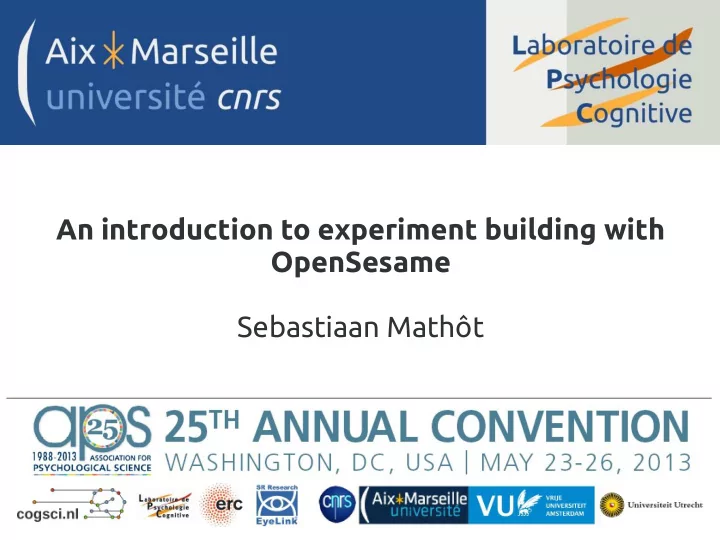

An introduction to experiment building with OpenSesame Sebastiaan Mathôt
Today ● A short introduction (20 min) ● Create a simple experiment (50 min) ● Coffee break ● Design your own experiment (50 min)
About OpenSesame
About OpenSesame ● A graphical experiment builder – Drag-and-drop, point-and-click – Complement with Python scripting ● Open source – Free of charge – Source code available ● Cross platform – All major platforms – Runtime support for Android
About OpenSesame ● A broad focus – Fits many types of research ● Psychophysics – Reaction time tasks, complex stimuli, etc. ● Neuroimaging – Parallel-port triggers, etc. ● Social psychology – Questionnaires, etc. ● Clinical applications – Test batteries, etc.
Support ● Documentation – http://osdoc.cogsci.nl ● Community – http://forum.cogsci.nl – ~500 members, daily activity, very responsive ● Outlook – Will OpenSesame still be there in [X] years? – Active development team – Large user base
Developers ● A core team Daniel Schreij Lotje van der Linden Edwin Dalmaijer VU University Amsterdam Aix-Marseille Université Utrecht University ● Occasional contributors
Teaching
Teaching ● No licensing issues ● No steep learning curve ● Used for teaching at universities across the world
Using OpenSesame
Items ● Items are building blocks ● Ten core items offer common functionality
Plug-ins ● Plug-ins are additional items – Eye trackers – Video playback – Forms – Etc. ● Plug-ins also provide graphical controls ● New plug-ins can be written easily
User interface vs script
Combining GUI and script ● The GUI generates a script – Custom language – Not Python! ● You can edit this script directly ● Afterwards you can continue using the GUI
Combining GUI and script ● You can create a prototype display using the GUI, and add variables using scripting ● Prototype script: – draw image 0.0 0.0 "gaze_ left .png" scale=1.0 center=1 show_if="always" ● Variable script: – draw image 0.0 0.0 "gaze_ [gaze_cue] .png" scale=1.0 center=1 show_if="always"
Back-ends
Back-ends ● There are many ways to control the display, input, etc. ● OpenSesame is not tied to one method ● Back-ends can be flexibly added, like plug-ins
Back-ends ● Each back-end has its ● Expyriment → Simple with good temporal precision own benefits ● Legacy → Fallback, modest – Temporal precision temporal precision – Stability ● Psycho → PsychoPy based, good temporal precision – Extra functionality ● Droid → For Android – Cross-platform devices support
And now for the tutorial!
Recommend
More recommend